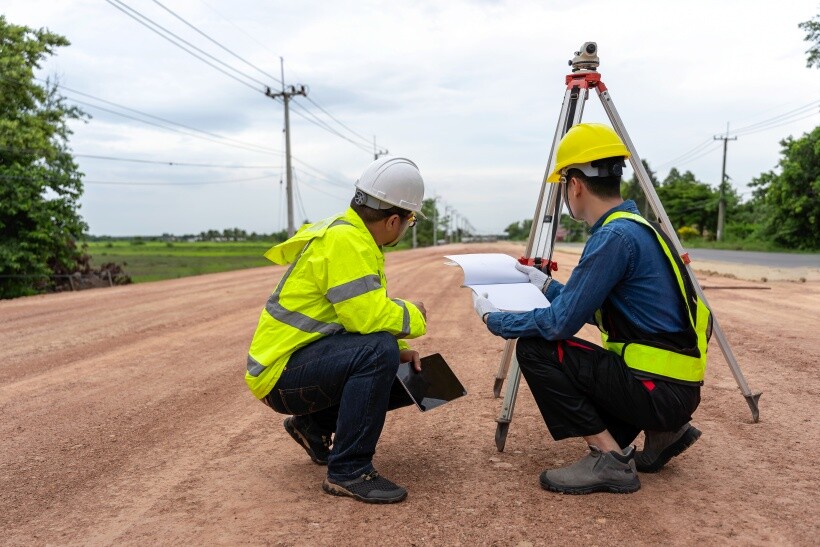
- Home/
- Comparisons/
- Building Surveyor/
- Building Surveyor vs Quantity Surveyor
Building Surveyor vs Quantity Surveyor: How to Choose the Right Expert
Know who to call before you build or buy
Published on
Key Facts
- A building surveyor is a professional who evaluates the physical condition of buildings, identifies structural and maintenance issues, and ensures compliance with building regulations and standards.
- A quantity surveyor is a professional responsible for managing the costs and budgets of construction projects, providing financial oversight and cost planning to ensure projects stay within budget.
You’re about to take a big step with building or buying a new property! But before you get too far, it's crucial to have the right surveyors in place. Remember the disastrous state of Ted Mosby’s house in How I Met Your Mother? Don’t make the same mistake, call in a building surveyor before you buy anything or a quantity surveyor to manage the costs!
If you’re still unsure about quantity surveyor vs building surveyor, this guide has you covered.
What do building surveyors do?
 Quantity surveyor and project manager reviewing site plans while overseeing construction progress (Source: iStock)
Quantity surveyor and project manager reviewing site plans while overseeing construction progress (Source: iStock)
Building surveyors check the overall condition of buildings to ensure they’re safe and up to standard. They look at both the inside and outside of a property, including the roof, walls, floors, windows, and doors. Building surveying consists of finding any problems, such as cracks, damage, or potential safety risks, and recommending necessary repairs or maintenance.
Building surveyors also make sure that buildings meet local building regulations, fire safety rules, and accessibility standards. They may issue important documents like building certificates, handle permits, and help with planning applications. In some cases, they also provide advice on property disputes or assess damage after events like fires or floods.
What do quantity surveyors do?
 A quantity surveyor working on cost estimates and floor plan measurements (Source: iStock)
A quantity surveyor working on cost estimates and floor plan measurements (Source: iStock)
Quantity surveyors manage the costs and finances of a construction project, ensuring everything stays within budget. Their main role is to estimate how much the project will cost, monitor expenses, and make sure the work is completed on time without going over budget. They also help ensure the project meets legal requirements and quality standards.
Quantity surveying entails working closely with architects and engineers, as well as contractors and subcontractors to make sure the design and construction plans are affordable. They create cost estimates, schedules, and reports to keep the project on track. By overseeing expenses and contracts, they help avoid unexpected costs and delays, making the construction process smoother and more efficient.
Quantity surveyor vs building surveyor: Which role is essential for your construction project?
Now that you understand the basics of a building surveyor and a quantity surveyor, let’s explore their specific roles and differences. Surveyors are crucial to a construction project, but each of their expertise covers distinct areas. Knowing these differences will help you decide whether you need one or both to ensure your project runs smoothly.
In terms of area of focus
 Building surveyors reviewing site plans and using surveying equipment (Source: iStock)
Building surveyors reviewing site plans and using surveying equipment (Source: iStock)
A building surveyor is primarily concerned with assessing the physical condition of a property, examining its structural integrity, identifying defects, and determining necessary maintenance or repairs. Their focus is on ensuring the building’s safety, stability, and compliance with regulations.
In contrast, a quantity surveyor, including a residential quantity surveyor, concentrates on the financial aspects of construction projects. They estimate costs, manage budgets, and oversee tendering and contract administration to ensure that projects stay financially on track. While building surveyors focus on the physical structure, quantity surveyors are dedicated to the economic and financial planning side of construction.
In terms of responsibilities
In a building construction project, a building surveyor conducts inspections, assesses structural integrity, and identifies defects or maintenance issues, providing recommendations for repairs and improvements. They prepare detailed building reports and offer expert advice on necessary actions to ensure a building’s safety and compliance.
In contrast, a quantity surveyor is responsible for the financial management of the project, including cost planning, estimating, and budgeting. They research and analyse the cost of materials, manage tenders and contracts, and oversee payment valuations and final account settlements. While building surveyors ensure the structure meets all necessary standards, quantity surveyors manage the financial aspects to keep construction projects within budget.
In terms of qualifications
The qualifications required for building surveyors and quantity surveyors share some similarities but focus on different areas of expertise.
Building surveyors typically hold a degree in building surveying or a related field, such as construction management or building engineering, and often have formal training in structural design, making them experts in assessing the physical condition and safety of structures.
On the other hand, quantity surveyors are usually trained in quantity surveying, construction engineering, or civil engineering, with a strong focus on analysing the cost of materials and managing project finances.
Both professions require membership in professional bodies like the National Society of Professional Surveyors (NSPS).
In terms of skill set
 A surveyor using a drone for aerial inspection and site measurement (Source: iStock)
A surveyor using a drone for aerial inspection and site measurement (Source: iStock)
A building surveyor and a quantity surveyor have distinct skill sets that reflect their specialised roles.
Building surveyors possess deep knowledge of building construction, materials, and local building regulations, allowing them to assess the structural integrity and safety of properties. They’re skilled at identifying defects, applying construction technology, and communicating their findings in clear reports or presentations.
For example, if you’re focused on residential properties, a house surveyor, a specialised type of building surveyor, specifically assesses the safety and condition of home structures.
On the other hand, quantity surveyors excel in mathematical analysis, construction costs, and contract management. They are adept at navigating pricing, procurement procedures, and contract law, using their analytical skills to keep projects within budget.
Both roles require proficiency in communication, but while building surveyors focus on technical building details, quantity surveyors ensure financial efficiency.
In terms of project involvement
In terms of project involvement, a building surveyor typically engages at key intervals: in the beginning with initial site inspections to ensure compliance, and at the end of the project to perform final assessments. They may also be called during construction to monitor progress and address structural or regulatory concerns as they arise. However, their involvement is generally more limited in duration and scope.
Meanwhile, a quantity surveyor remains actively involved throughout the entire lifecycle of the project, from early cost planning to final account settlement. This continuous engagement allows them to oversee the financial health of the project, monitor expenditures, and manage contracts, making their role more integrated into the day-to-day operations.
While the building surveyor steps in at crucial stages, the quantity surveyor ensures that the project stays financially viable and on track from start to finish, providing a more overarching involvement.
In terms of service fee
A building surveyor and a quantity surveyor serve distinct roles in the construction and property sectors, which is reflected in their service fees. Building surveyors typically conduct detailed inspections of properties, focusing on structural integrity and maintenance needs. Their fees for building surveys range from $400 to $1,500, influenced by factors such as survey type, property size, and condition.
In contrast, quantity surveyors primarily manage construction costs, helping clients keep track of the overall budget for projects, including the cost to build a house, which can be between $100 and $500 per square meter. They then charge 1% to 5% of the total cost, depending on the project's scale and complexity. They also advise on land survey costs, which range from $50 to $500, to ensure efficient project execution.
Connect with a local building or quantity surveyor now
 Building surveyor using a theodolite to measure structural levels (Source: iStock)
Building surveyor using a theodolite to measure structural levels (Source: iStock)
Finding the right surveyor is key to ensuring your project runs smoothly, whether you need a building surveyor specialist to evaluate a property’s condition or a quantity surveyor to manage the financial aspects of construction.
With Airtasker, you can easily post a task and locate a nearby building or quantity surveyor who can help you out. You can then review offers, compare portfolios, ratings, and reviews to secure the best fit.
A qualified surveyor will help keep your project on course, ensuring every detail is professionally handled, from inspections to cost management. Before hiring, make sure they follow the International Building Code (IBC) and adhere to state and local regulations. Start today to get the expertise you need for a well-managed project!
Building surveyor vs quantity surveyor
| Building Surveyors |
Quantity Surveyors |
|
|---|---|---|
| Area of Focus | Assessing physical condition, structural integrity, and maintenance needs |
Financial management, cost estimation, and budgeting |
| Responsibilities |
Conduct inspections, assess defects, and provide maintenance recommendations |
Manage budgets, oversee contracts, and ensure financial tracking |
|
Qualifications |
Degree in building surveying or related field, with a focus on structural design |
Degree in quantity surveying or civil engineering, focused on cost analysis |
| Skill Set |
Knowledge of construction, materials, regulations, and defect identification |
Expertise in mathematical analysis, contract management, and procurement |
| Project Involvement |
Engages at key intervals (initial inspections, final assessments) |
Involved throughout the project lifecycle from planning to final settlement |
| Service Fee |
Fees range from $400 to $500 for detailed surveys |
Takes in 1% to 5% of the total project cost |
FAQs on building and quantity surveyors
The difference between chartered surveyor vs quantity surveyor is that a chartered surveyor is a chartered surveyor is a professional who has been certified after meeting the requirements of a recognized professional body, such as the globally renowned Royal Institution of Chartered Surveyors (RICS). Once chartered, they can specialize in various surveying fields. A quantity surveyor falls under this umbrella, focusing specifically on cost management and financial oversight of construction projects.
Yes, it’s possible! Some surveyors may have expertise in both building surveying and quantity surveying, offering a more comprehensive service to clients by managing both the physical condition assessments and the financial management of a property.
Yes, a building surveyor can assist with defect liability periods. They review and assess defects during inspections, provide expert advice, and manage settlement negotiations if needed.
There are various types of surveyors, including building, quantity, land, rural, mining, and valuation surveyors. Each specializes in different aspects of property, construction, or land management.
Find building surveyors, fast
Post a task
Related price guides

How much does a land surveyor cost?
Read more